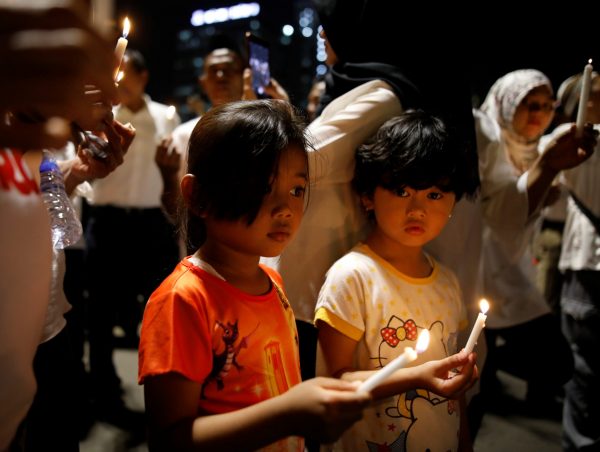Kinship has been a constant theme throughout the various iterations of Indonesia’s militant Islamist movements. In the 1950s, an Islamic mystic named Kartosoewirjo led an uprising aimed at establishing an Islamic state in the archipelago. Thirty years later, his grandson Tahmid Rahmat Basuki would continue the struggle as a leader of Darul Islam in the 1980s.
Three brothers were central figures in the 2002 Bali bombing attacks. Their extended family ran a pesantren (an Islamic boarding school) in Lamongan with close links to the Ngruki pesantren in Solo established by Jemaah Islamiyah founders Abdullah Sungkar and Abu Bakar Ba’asyir — whose sons are also active in the movement.
At least four of those involved in the 2009 hotel bombings in Jakarta were family members from a village in West Java. Various active cells and plans over the years, including the Aceh training camp uncovered in 2009, involved combinations of family members.
Links are often through blood lines but leaders have made concerted efforts to secure the movement through marital linkages. In 2003, the International Crisis Group noted that Jemaah Islamiyah consisted of an ‘intricate network of marriages that at times makes it seem like a giant extended family’. Family bonds among Indonesian extremists, which are further entrenched through the enrolment of children in connected pesantren, often unite factional divides. Ideology and strategy may have shifted from Darul Islam to Jemaah Islamiyah to Jamaah Ansharut Daulah, but relational ties built over generations will continue to bind the movement.
The attacks in Surabaya present a grisly evolution, as individual nuclear families — including children — conducted suicide bombings as units. This development reflects the influence of the so-called Islamic State (IS), whose uncompromisingly brutal strategy involves brainwashing and desensitising children through horrific violence to create child soldiers or ‘cubs’. The assaults also marked the first time women carried out suicide bombings on Indonesian soil. A small group of women linked to IS recruiter Bahrun Naim came close to conducting an attack on the Presidential Palace in Jakarta in late 2016, but the plan was ultimately thwarted by police.
Indonesian Police Chief Tito Karnavian initially claimed that the family responsible for the Surabaya church bombings had travelled to Syria in recent years. This statement now appears to be inaccurate, yet the police chief’s concerns highlight the difficulties Jakarta faces in addressing returning extremists, many of whom are families with children.
Over the past 18 months alone, the Turkish government has repatriated over 220 Indonesian citizens who failed to enter Iraq and Syria to link up with IS. Women and children made up a large proportion of those sent home. Deportees have been held for one month at one of two facilities in East Jakarta run by the Ministry of Social Affairs (Kemensos) before returning to their communities. The national counter-terrorism agency has run seminars aimed at ‘de-radicalisation’ but the Kemensos-led reintegration initiative has been forced to operate off-budget. Inexperienced social workers struggle to make progress with the uncooperative extremists.
Suboptimal coordination between security agencies, NGOs and local governments has hindered the reintegration process. Many deportees arrive back in their communities only to disappear once again. Surveillance and the monitoring of terrorism suspects is difficult for even the best-resourced nations but Jakarta should still re-evaluate its approach. If regional social workers were given the resources and training to engage families disengaged from society, their efforts could produce a much-needed first line of defence that could link up with police if and when required. A more coordinated leadership structure to enable appropriate flows of information and a clear designation of responsibilities is also crucial.
Of immediate concern will be passing the anti-terrorism legislation that has been crawling through parliamentary processes since its hasty tabling following the early 2016 Thamrin attack in central Jakarta. Disagreements over the more sensitive aspects of the legislation have produced controversial sticking points, such as the possibility of increased involvement of the Indonesian military and the potential introduction of preventative detention.
The current Law No.15/2003 on the Eradication of Terrorism has no articles on fighting abroad, recruitment to proscribed organisations or prevention efforts. In the wake of the Surabaya attacks, Indonesian President Joko Widodo warned lawmakers that if the new legislation is not ready by June 2018, he will issue a government regulation in lieu of law to ensure the right tools are available to law enforcement.
The first Bali bombing in 2002 led to a similarly rushed scenario. It has often been the case in Indonesia that security, vigilance and debate is heightened in the weeks following a terrorist attack, but complacency can set in before real changes are made. Stakeholders hope more rigorous counter-terrorism legislation will be passed swiftly without compromising human rights. But Indonesia’s deeply entrenched militant Islamist movement, events in Iraq and Syria and the current homecoming of intrepid extremists from the Middle East all suggest the problem will get worse before it improves.
Cameron Sumpter is an Associate Research Fellow at the Centre of Excellence for National Security, a constituent unit of the S Rajaratnam School of International Studies (RSIS), Nanyang Technological University, Singapore.

